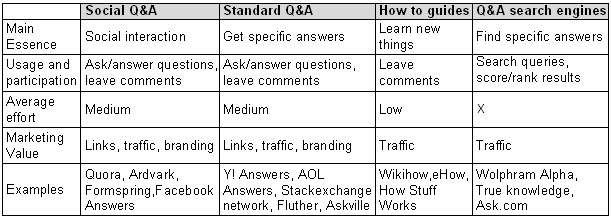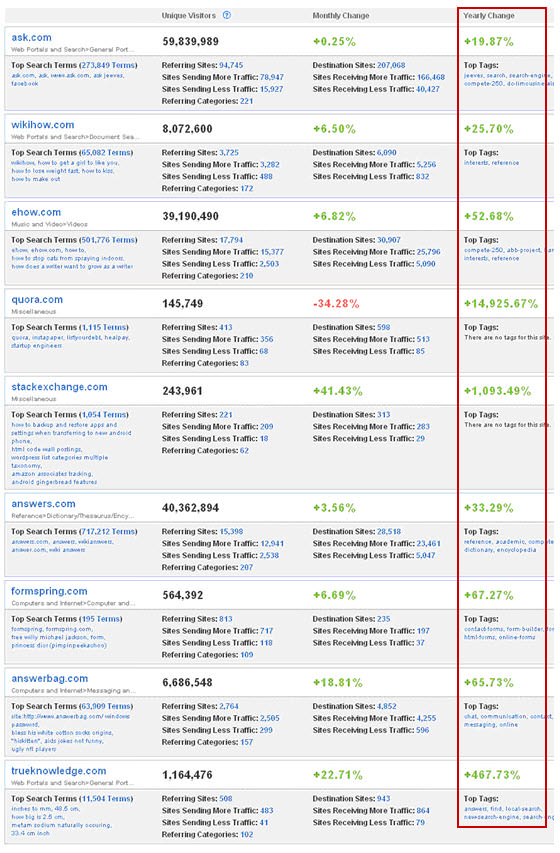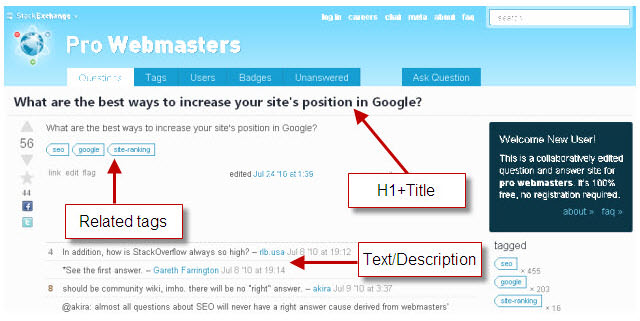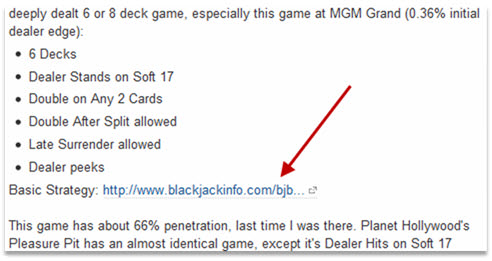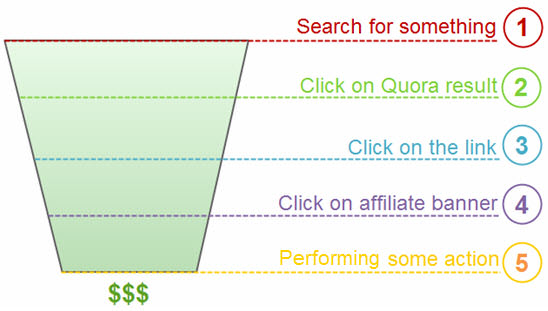SEOmoz Daily SEO Blog |
| 6 Reasons Why Q&A Sites Can Boost Your SEO in 2011 (Despite Google's Farmer Update) Posted: 15 Mar 2011 03:51 AM PDT Posted by Pavel Israelsky This post was originally in YOUmoz, and was promoted to the main blog because it provides great value and interest to our community. The author's views are entirely his or her own and may not reflect the views of SEOmoz, Inc. A lot of SEO predictions for 2011 were published in the end of 2010, while not many marketers mentioned the increasing popularity of Q&A sites. I think that it could be a great opportunity to exploit this new rising phenomenon for our marketing efforts while it's still fresh. Why shouldn't you worry about Google's Content farm update? I'm pretty sure that you're already familiarized with the Google's recent farmer update, and might think that Q&A sites are useless now. But if you take a closer look, there are a bunch of quality Q&A sites that did not suffer at all and can still be used for your marketing efforts. It's important to use only these kinds of sites as part of the following techniques, to get the most value for your efforts. I believe that Google (and other search engines) should try and fit their offering to users according to changes on the web, so completely ignoring a rising concept such as Q&A platforms will be like shooting themselves in the foot. What's a Q&A site and how does it work? Before diving into the endless marketing opportunities of this concept, it's important to understand what a Q&A site is and how exactly it works. The simplest definition can be found in Wikipedia: "A Q&A website is a website where the site creators use the images of pop culture icons to answer input from the site's visitors, usually in question/answer format." While this definition mainly refers to the traditional type of Q&A sites, the whole concept refers to the following four groups:
This table highlights the main purpose and value of each group, and we will see how we can use each group in a different way. The following article will mainly concentrate on the potential of the first two groups – social and standard Q&A sites. Also, the examples for each group include only general websites and not niche oriented (which are of course useful for the following techniques). Now that we have clearer picture of the different kinds of Q&A sites, let's see the top seven reasons to use them, in order to improve our online acquisition efforts. 1. Recent Trend: people google more questions than generic keywords It doesn't necessarily mean that the search volume of generic keywords is higher. But we can clearly see that there's an extreme increase in the search volume of question quarries, while at the same time a slight decrease in the search volume of generic primary keywords. The most interesting fact of this phenomenon is that it happens with keywords from the same topic. To visualize this data, I chose some competitive generic keywords and related questions for those keywords. Than compared with Google KW Tool the difference between their search volumes in 2010. For example, here's a comparison between the search volume of both generic and questions quarries for iphone keywords (it's "exact" search):
2. QA sites have become much more popular in the last year Another evidence for this phenomenon, can be found in the fact that the traffic to QA and "how to" sites has been dramatically on the rise in the last year. Using Compete comparison, we can see the yearly change among some of these sites (unique visitors):
This is a very interesting trend, which can tell us a lot about the evolution of our search habits. What does it say about our web search psychology? How will this change impact the search engine's relevancy algorithm? While the content farm update "erased" some of these sites, there will probably be new alternatives that will take their place (the next point can explain why). 3. Q&A pages ranked high in search results It seems that pages from QA sites rank pretty well in organic search results. These pages are highly on-page optimized for the main keywords, well engaged by the users and are continuously updated by users. Here are some reasons why these pages might rank high:
Knowing that, you can simply search for the most relevant questions related to your keywords and start dropping useful answers. Of course in addition to your answers, you can place links within the text in a relevant context. This way, you can drive some really targeted traffic and increase your backlinks profile. It's better to start with QA pages that are already ranked high in SERPs, since they already have existing and relevant traffic.
After dominating the 1st result page for your related terms, it's time to expand your sources by searching within the QA sites themselves. You can use Questionhub to save a lot of time. Questionhub is a giant aggregator that gathers questions from various QA sites around the web. Using Questionhub, you can find a lot of relevant Q&A pages in which you can leave answers and links to your site. 4. Great opportunity to diversify your backlinks profile It's always recommended to include links from various kinds of websites in your backlinks profile, and not to concentrate just on one type (e.g. blogs, forums, news sites, social bookmarks/networks, static sites etc...). Basically there are two main reasons why you should get links from various sources:
If you expect to find some dofollow links with anchor text, you might be disappointed. But it doesn't matter as they will still be counted by Google (you can see them clearly in your webmaster tools account). And in any case, like I said before, it's a great opportunity to diverse your backlinks profile. 5. Pages that people prefer linking to Let's say you wrote some really nice piece of content about car insurance for your blog. Since you want to make it useful for your users, you will link from it to external sources in a relevant context. But which pages will you probably link to? Will you link to some pages from commercial/corporation websites, or to some Q&A or "how to" pages? Let's assume for example that both options have the same relevancy to your content, and both deal with a narrow topic that you can't find on Wikipedia. I'm pretty sure that you will choose the 2nd option in such case. Why do people prefer to link to such sources?
Build your own Q&A asset and gain natural links The best way to benefit from this behavior and attract links, is to establish your own Q&A property. This kind of asset can be built on a separate domain or on a subdomain/subfolder in your existing domain. There are a lot of free open source solutions for building such platforms, just choose one (it's pretty ironic that I naturally found the Q&A site which I'm linking to right now, using the same technique I've described in the previous paragraph J). After establishing the platform, you should think about a keyword strategy that will assist you in focusing your content. It's better to have a targeted Q&A section with questions related to specific and narrow topics, rather than general ones. So for example if you have a hotel - website, focus your content only on this field by covering all related long tails. If all questions will be related to a specific topic, it will encourage users to use your platform because they will treat it as an authority source to get answers (will you prefer to ask about hotels in a dedicated or general source?). It will also encourage expert users to leave answers (ego?), especially if they have a business or a website in the hotel industry that they wish to promote. Now that we know which keywords we should focus on, it's time to fill them with some initial questions/answers and spread the word. Here's a quick action items list that will assist you with this mission:
6. Targeted traffic = better conversion Imagine that you are a blackjack enthusiast, and next month you're traveling to Las Vegas for a vacation. Since this will be your first visit to Vegas, it's reasonable that you will search questions like "Which casino has the best blackjack game in Las Vegas". Chances are you will hit a Quora result:
In this page you will find some very informative answers from anonymous users, who describe various casinos in Vegas and even provide some blackjack tactics. In fact, this answer is so informative and insightful, that you just can't ignore it. I bet you also won't ignore the single link within the content, which refers to a blackjack strategy page:
Now when you click on the link, chances are high that you will also click on the affiliate banner in this blackjack website and the rest is history. Let's see how the funnel of this process looks like:
You can use this technique for both link building efforts and traffic generation. But if you are looking only for SEO benefits, you should concentrate mainly on getting such links. While these kinds of links may be worthless in terms of link juice as they are not followed, but they do have an alternative added value:
What is your experience with Q&A sites? The techniques shared in this article can improve your SEO campaign, especially in a competitive niche. If all your competitors are doing pretty much the same – this is a great chance to be prominent and bring something different to the table. Have you been using Q&A sites as part of your SEO tactics? How exactly? Or are you completely sure that these tactics don't have any value? Your thoughts are more than welcome. |
| Traffic Source Diversity is Essential for Successful SEO Posted: 14 Mar 2011 05:08 PM PDT Posted by randfish I recently created some custom filters in Google Analytics to illustrate SEOmoz's traffic over the past 12 months: SEOmoz's Traffic Sources Distribution
Here's the breakdown in percentages:
As SEOs, we know that search traffic has vulnerabilities and fluctuations that are out of our control. The recent examples of sites that were unintentionally affected in the the Farmer/Panda update is a good example, but there are hundreds of potential issues, both from our own efforts and those of others (the engines themselves, our competitors, etc.) that can affect things outside of large-scale algo updates. We've also felt the search engines moving in a more "holistic" direction, and seeking features that "brands" have, but generic sites don't in order to reward the former in their rankings. I did a presentation on this topic at the recent Be-Wizard! San Marino event, included below:
The Evolution of Google's Rankings View more presentations from randfish
It's my sense that increasing the diversity of sources is an excellent path for online marketers to take, especially at this junction, because:
Of course, knowing what we have to do is the easy part. Executing on that is much more challenging. That's why, over the next 18 months, it's my goal to start investing more energy into research, case studies, content and, of course, software, to help. In order to win at SEO, we're going to need to win at ALL of inbound marketing, and luckily, the side effects are incredibly beneficial, too. |
| You are subscribed to email updates from SEOmoz Daily SEO Blog To stop receiving these emails, you may unsubscribe now. | Email delivery powered by Google |
| Google Inc., 20 West Kinzie, Chicago IL USA 60610 | |


